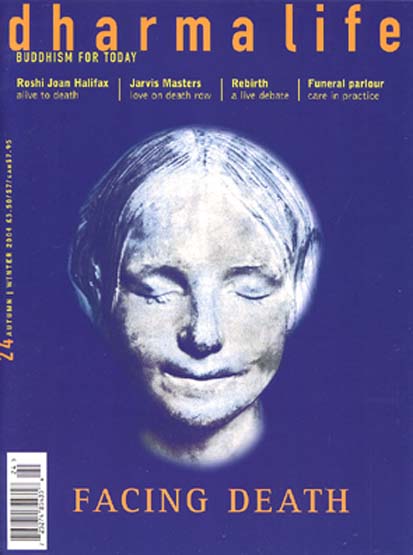Facing Death:Editorial
For the past five years I have shared a community house with Sangharakshita, the founder of the Western Buddhist Order, who is just a year off his 80th birthday. Three years ago his eyesight failed and, after a lifetime of voracious reading, he could no longer make out the words on a page. For a while he responded with equanimity, but some time later he found himself unable to sleep and - for all his profound practice and realisation - he struggled to adapt.
In the middle of one endless night he called me to sit up with him (he has asked others on many occasions). He started to speak about Shakespeare's King Lear, who gives away his kingdom to two of his daughters, only to find that, consumed by their own interests and concerns, they deny him the respect and privileges he craves. Why do you need them? they ask. 'O, reason not the need,' Lear famously replies, 'our basest beggars are in the poorest things superfluous.'
'The daughters who rob us,' Sangharakshita said, 'are the forces of nature who strip us in old age. Mother nature is taking back what she has given.' In a sense none of us - not even a beggar - needs anything beyond the barest of necessities. And yet, as the Buddha might comment, we seem able to know who we are only by dressing ourselves in all the accoutrements of our lives.
The notion that in death we are stripped of everything which gives us a sense of identity is central to the Bardo Thodol (or Tibetan Book of the Dead). This text graphically extends the Buddhist belief that after death we are reborn in accordance with our karma. It dramatises the intermediate state (or bardo) into an account of the spiritual phantasmagoria that it says appear to people in the days after they have died. The message of the Bardo Thodol is that these figures are all 'our own thought-forms'. Shorn of our body and released into an unimaginable boundlessness, the text suggests that our minds construct visionary figurations of our most basic hopes and fears. All but the strongest miss the opportunity this state offers, so we lurch towards re-embodiment in a familiar form, even though this also brings us familiar habits and sufferings.
Some read this account as factual testimony, others as a product of the mythic imagination, but either way it suggests the existential challenge at the heart of our relationship with death. Buddhism emphasises death and impermanence because it addresses human beings in their most essential nature.
Perhaps the most frightening aspect of death is that it is solitary. 'We die as we dream - alone,' says the French poet Valery, for in death our friends and lovers can neither join us nor help us. Several contributors to this issue are driven by a desire to respond to this aloneness. Joan Halifax Roshi shares her Zen practice of being in the present moment by helping people who work with the dying. Vajrashraddha, another woman who brings wholehearted passion to her work, comments that in western culture, by turning away from death, we neglect those people most in need of compassionate understanding - the dying and bereaved.
Most haunting for me is the story by Jarvis Masters, a Buddhist prisoner on California's death row, about a fellow prisoner's realisation that his mother might die before him and he should see her before it is too late: 'Russell had never let himself think about the fact that he could lose his mother while in prison. On death row the closest fear is your own death. This can so consume you that it seems as if everyone you love on the outside is guaranteed to outlive you.'
Buddhist texts often compare the condition of human beings to that of prisoners awaiting execution, and suggest that we seek escape from the unconscious knowledge of death's certainty through denying that it will happen. Our secret fantasy is that we are immune to the great epidemic that sweeps off generation after generation. Alternatively we imagine that death affects only ourselves - and that we have been singled out for punishment.
Buddhism urges us to confront directly the realities of old age, sickness and death, and learn to live a meaningful life in the light of that awareness. Intellectual awareness of death is one thing, but a deep, living experience of its reality is quite another. The contributors to this issue have all confronted the challenge of 'facing death' and, as their editor, I feel humbled by their depth, compassion and humanity.
Vishvapani


